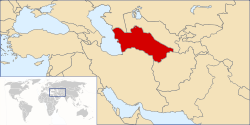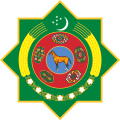

The following outline is provided as an overview of and topical guide to Turkmenistan:
Contents
- General reference
- Geography of Turkmenistan
- Environment of Turkmenistan
- Regions of Turkmenistan
- Demography of Turkmenistan
- Government and politics of Turkmenistan
- Branches of government of Turkmenistan
- Foreign relations of Turkmenistan
- Law and order in Turkmenistan
- Military of Turkmenistan
- Local government in Turkmenistan
- History of Turkmenistan
- Culture of Turkmenistan
- Art and Culture in Turkmenistan
- Sports in Turkmenistan
- Economy and infrastructure of Turkmenistan
- Education in Turkmenistan
- Health in Turkmenistan
- See also
- References
- External links
Turkmenistan is a sovereign Turkic country located in Central Asia. [1] The name Turkmenistan is derived from Persian, meaning "land of the Turkmen". The name of its capital, Ashgabat, derived from Persian as well, loosely translating as "the city of love". Until 1991, it was a constituent republic of the Soviet Union, the Turkmen Soviet Socialist Republic. It is bordered by Afghanistan to the southeast, Iran to the southwest, Uzbekistan to the northeast, Kazakhstan to the northwest, and the Caspian Sea to the west.
Although it is wealthy in natural resources in certain areas, most of the country is covered by the Karakum (Black Sands) Desert. It has a one-party system, though other parties exist. The country was ruled by President for Life Saparmurat Niyazov until his death on 21 December 2006. Presidential elections were held on 11 February 2007. Gurbanguly Berdimuhammedow was declared the winner with 89% of the vote. He was sworn in on 14 February 2007, and has been re-elected twice since, in 2012 and 2017.




